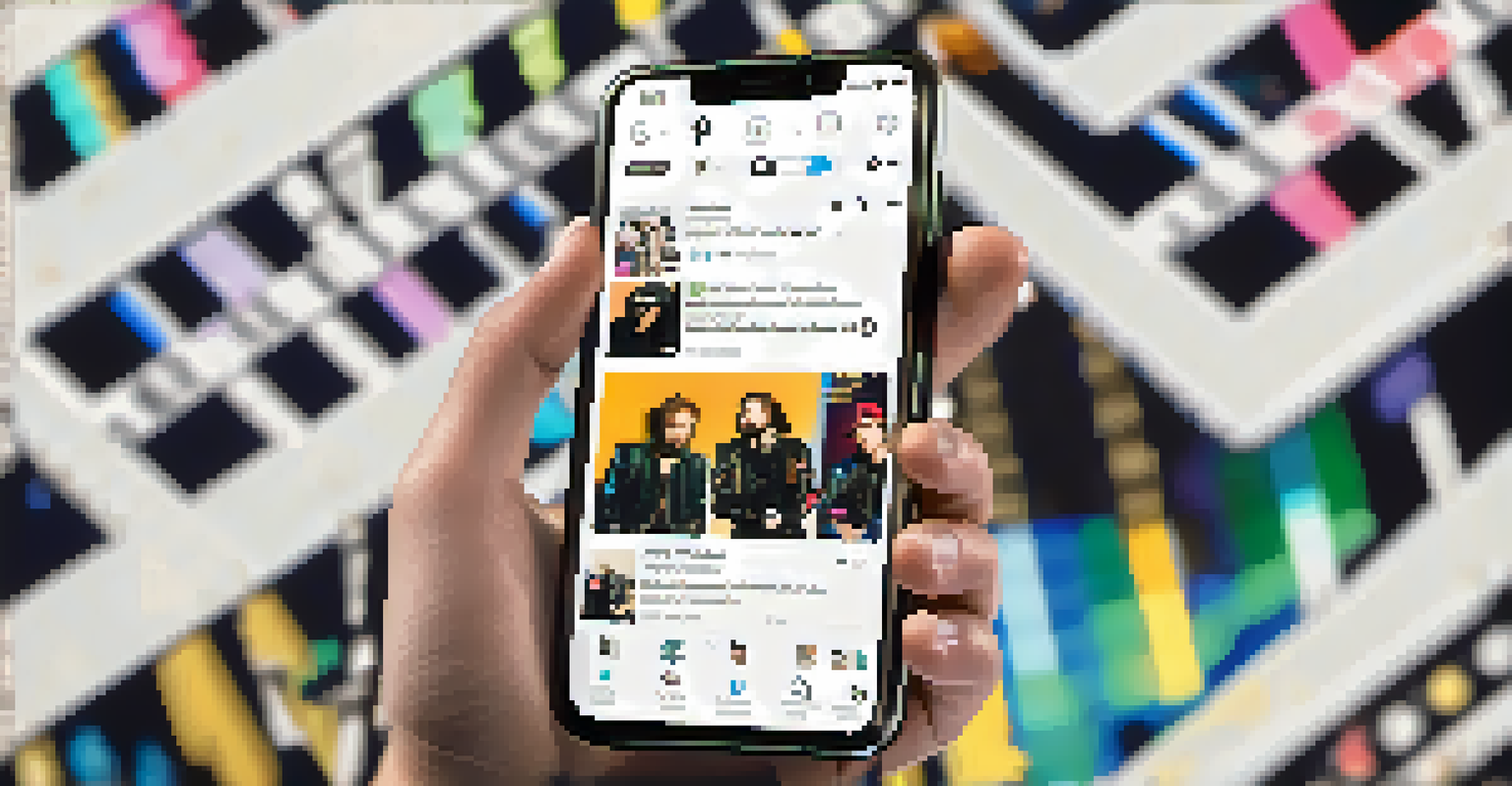The Impact of Digital Distribution on Music Sales Strategies

Understanding Digital Distribution in the Music Industry
Digital distribution refers to the process of delivering music through online platforms, rather than traditional physical formats. This shift has opened up vast opportunities for artists and labels to reach global audiences. By using platforms like Spotify, Apple Music, and Bandcamp, musicians can bypass traditional gatekeepers and connect directly with fans.
The future of music lies in the hands of independent artists who can navigate the digital landscape without traditional gatekeepers.
With digital distribution, the barriers to entry in the music market have significantly lowered. Independent artists can now share their work without the need for a record label, enabling a more diverse range of voices. This democratization of music distribution has fostered a vibrant ecosystem where creativity flourishes.
However, this accessibility also comes with challenges, as the sheer volume of music available can make it difficult for individual artists to stand out. Navigating this crowded landscape requires strategic thinking and innovative marketing approaches to capture listeners’ attention.
The Shift from Physical to Digital Sales
In recent years, we've witnessed a dramatic decline in physical music sales, with digital formats dominating the market. Consumers increasingly prefer the convenience of streaming services, which offer instant access to millions of songs. This shift has forced artists and labels to reconsider their sales strategies and adapt to changing consumer behaviors.

Streaming has become the primary revenue source for many artists, but it operates on a different financial model than traditional album sales. Instead of earning a lump sum from album purchases, musicians now receive smaller payments based on the number of streams. This change necessitates a shift in how artists approach their income and revenue generation.
Digital Distribution Empowers Artists
The shift to digital distribution allows artists to reach global audiences directly, bypassing traditional gatekeepers.
As a result, developing a strong online presence and engaging with fans through social media has become crucial for artists. Building a loyal following can directly influence streaming numbers, making fan engagement an essential component of modern music sales strategies.
The Role of Social Media in Music Promotion
Social media has revolutionized how artists promote their music, serving as a powerful tool for reaching and engaging with fans. Platforms like Instagram, TikTok, and Twitter allow musicians to share snippets of their work, behind-the-scenes content, and personal stories, creating a more intimate connection with their audience. This personal touch can significantly increase fan loyalty and support.
In the world of music, the artist's brand is as important as the music itself.
The viral nature of social media can also lead to explosive growth for emerging artists. A single post or video can catapult a song into the spotlight, leading to increased streams and sales. For example, TikTok has become a launchpad for countless hits, highlighting how social media can shape music trends and sales.
However, maintaining a consistent and authentic presence on these platforms is essential. Artists must balance promotion with genuine interactions to build a community around their music and avoid coming across as insincere or overly commercial.
Data Analytics and Music Sales Strategies
In the digital age, data analytics has become an invaluable tool for artists and labels to understand their audience better. By analyzing streaming statistics, social media engagement, and demographic information, musicians can tailor their marketing strategies to reach specific listener groups more effectively. This data-driven approach allows for more strategic decision-making in music sales.
For instance, if an artist discovers that a significant portion of their audience is in a particular city, they might prioritize touring there or target ads to that location. Understanding listener preferences can also guide the creation of new music that resonates with fans, ultimately boosting sales and engagement.
Social Media Boosts Music Promotion
Platforms like TikTok and Instagram enable artists to engage with fans and promote their music effectively.
Moreover, monitoring trends and feedback in real-time enables artists to pivot their strategies quickly. This agility is crucial in a fast-paced industry where consumer interests can shift overnight, allowing artists to stay relevant and connected to their audience.
The Importance of Brand Building for Musicians
In the crowded digital landscape, building a strong personal brand is crucial for musicians. A unique and recognizable brand helps artists stand out and fosters a deeper connection with fans. This goes beyond just music; it encompasses visuals, messaging, and the overall image the artist portrays online.
Creating a cohesive brand identity can enhance an artist's marketability, making it easier to attract partnerships and sponsorships. Brands are increasingly looking to collaborate with artists who have a strong fan base and a distinct identity. This can open up additional revenue streams beyond music sales, such as merchandise and endorsements.
Ultimately, a well-defined brand can lead to increased loyalty and support from fans. When listeners feel connected to an artist's story and values, they are more likely to engage with their music and support their career.
Emerging Technologies Shaping Music Distribution
Technological advancements continue to reshape the music industry, introducing new ways to consume and distribute music. Innovations like blockchain technology and artificial intelligence are gaining traction, offering artists new tools to monetize their work and connect with fans. These technologies can streamline the distribution process and enhance transparency in royalties.
For example, blockchain can provide a secure and efficient way to track music ownership and royalties, ensuring that artists receive fair compensation for their work. This could significantly change the landscape of music sales, making it easier for independent artists to thrive without relying on traditional systems.
Data Analytics Enhances Strategies
Utilizing data analytics helps artists tailor their marketing efforts and connect with specific listener demographics.
Additionally, AI-driven platforms are enabling more personalized listening experiences, helping users discover new music based on their tastes. This personalization not only benefits listeners but also allows artists to reach potential fans who may not have discovered them otherwise.
Future Trends in Music Sales Strategies
As the music industry evolves, it's essential for artists and labels to stay ahead of emerging trends. One significant trend is the rise of subscription-based models, where fans pay a monthly fee to access exclusive content from their favorite artists. This model not only generates steady income for musicians but also fosters a deeper connection with dedicated supporters.
Additionally, virtual and augmented reality experiences are gaining popularity, offering fans immersive ways to engage with their favorite artists. From virtual concerts to interactive music videos, these experiences can enhance fan engagement and create memorable moments that encourage music sales.

Looking ahead, it's clear that adaptability will be key for artists navigating the digital landscape. Those who embrace new technologies and trends while staying true to their artistic vision will be best positioned to succeed in an ever-changing industry.